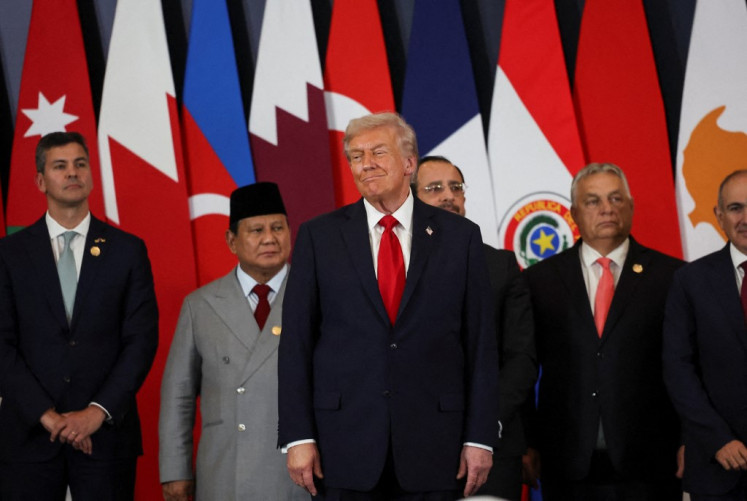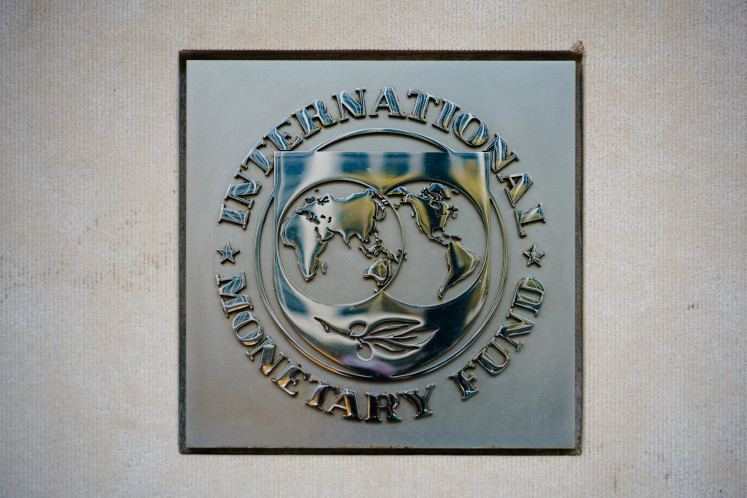Popular Reads
Top Results
Can't find what you're looking for?
View all search resultsPopular Reads
Top Results
Can't find what you're looking for?
View all search resultsAnalysis: Flagging rupiah: Fundamental or contagion?
The rupiah reached its lowest level since the 1998 Asian financial crisis against the US dollar in early September
Change text size
Gift Premium Articles
to Anyone
T
he rupiah reached its lowest level since the 1998 Asian financial crisis against the US dollar in early September. The currency has depreciated by 10 percent year-to-date.
The Indonesian government argues that external factors are the reasons for the rupiah’s fall, including the Federal Reserve’s monetary tightening continuation and the negative sentiment spreading over emerging markets (EM).
The authority explained that the 1998 crisis was not likely to repeat as Indonesia now has solid macroeconomic fundamentals. Moreover, it emphasized that it would implement some mitigation strategies to reduce the current account deficit (CAD) in order to curtail dwindling international reserves.
Bank Indonesia (BI) also asserted it would keep maintaining rupiah stability through preemptive, front-loading and ahead-of-the-curve policy, as well as FX market intervention. BI’s benchmark interest rate, known as the seven-day reverse repo rate (7DRR), has increased 125 basis points (bps) year-to-date.
The query then arises. How can the rupiah be directly and significantly affected by the currency crises happening in other EMs?
While it is true that Indonesia today is one of the best performing EMs and has much stronger fundamentals compared to in 1998 (lower inflation rate, lower external debt ratio, stable economic growth and higher official reserves), it must be realized that Indonesia has been more integrated in the global financial market. Indonesia, therefore, is more open to cross-border capital flow.
In the post-commodity boom era, it comes to rely more on capital from abroad in generating investments to accelerate growth (37 percent of government bonds and 55 percent of tradable stocks owned by foreign investors). The CAD reflects investment growth outpacing saving (saving-investment gap).
The deficit thus inevitably must be financed through foreign inflow. Indonesia consequently shall also bring in more risk and uncertainty from the international environment to the domestic financial market.
The most recent external shock transmitting risks into Indonesia is a currency crisis sourced from two of the largest EMs, namely Turkey and Argentina. Turkey’s economy showed impressive economic growth, causing inflation pressure to hike and the CAD to broaden. Annual inflation has reached a double-digit rate since February 2017.
Initially, the Turkish government kept the policy rate low by intervening in central bank’s monetary decision (prioritizing growth over stability). As this caused the Turkish lira to deeply depreciate (76 percent year-to-date) and triggered capital outflow, the policy rate then soared by 975 bps in the second quarter of the year.
Meanwhile, Argentina decided to put an end to the fixed exchange rate regime and cut subsidy spending in order to narrow fiscal deficit. This unfortunately resulted in high inflation. Overvalued currency and large external debts furthermore produced negative responses as investors were concerned about the ability of the administration to control inflation and to deal with the appreciating US dollar.
This provoked capital reversal, resulting in more rapidly depreciating Argentine peso (107 percent year-to-date) and skyrocketing policy rate (3,125 bps).
A currency crisis in one country can transmit to another because of their economic interdependencies as the crisis affects another country’s fundamentals through economic linkages, such as trade and financial links.
This is, however, not the case for Indonesia. Indonesia’s exports to and imports from Turkey and Argentina are insignificant. The investment realization from both countries is also relatively very small. Moreover, Indonesia’s fundamentals are now still more robust than the two countries. The only similarity with Turkey and Argentina is that Indonesia experiences widening CAD.
Then, what is the reason? It is a “pure contagion” that is responsible for today spillover negative sentiments across EMs, causing some EM currencies, including the rupiah, to plunge. Pure contagion refers to an economic event occurring in one specific country but quickly triggering capital market volatility elsewhere in the world without requiring fundamental correspondences.
For investors, a crisis in one country can be an indicator for other crises appearing in other countries as investors reassess existing information regarding those countries. They then can suddenly change their attitudes toward the countries with uncorrelated or imperfectly correlated fundamentals, sparking fears and hence dramatic capital selloffs.
Like Indonesia, Turkey and Argentina are EMs, part of G20 countries and facing a broadening CAD issue. This information is enough to punish Indonesia alongside the two countries. Why is that so? Trading EM securities compels investors to discover and collect information on each country involved, which is very costly.
It is because gauging country risk requires information processing about all key macroeconomic and political variables on a regular basis, no matter how large the investment is. Fixed-cost information thereby generates grouped signals, resulting in pure contagion and herding behavior (informational frictions). The contagion is greater in EMs because there is less demand for detailed information of each EM as their securities are less valuable than securities of developed countries (safe havens). With the background nowadays, the appetite for EM securities is even lower due to the trend of rising policy rates in some major developed countries.
Going forward, we believe that rupiah volatility and uncertainty in the domestic financial market will remain high. It is mostly still due to external pressure, encompassing the Fed’s tightening monetary policy at least until next year and the European Central Bank’s (ECB) starting next year, and global trade war potential that may remarkably reduce global trade volume.
At this stage, we view that monetary policy will have an effect faster than fiscal policy in managing the volatility in the coming short run. Positively, BI has conducted proper monetary policies like hiking the BI-7DRR to retain positive spread, FX market intervention and FX swap.
The government, however, must also be consistent with the policies that may boost exports, including providing export incentives and strengthening trade cooperation with non-traditional markets.
The government actually has announced some measures to shrink the CAD and to give positive sentiment to the market, such as enhancing export competitiveness, restricting consumer goods import (rising PPh 22 tariff), imposing biodiesel use (B20) to limit fuel import, increasing the level of domestic components (TKDN) for infrastructure projects and promoting the tourism sector.
This, however, will only be effective in the mid-term as those measures still shall not quickly attract capital to come in, especially in today’s global monetary tightening circumstance.
The government additionally needs to keep maintaining its credibility, improving certainty in policy implementation and prioritizing its infrastructure programs to entice outside funds. In the long run, Indonesia has to overcome its everlasting structural issues, including reducing the high dependency on raw export commodities and urging the development of export-oriented manufacturing industries as it may increase exports and attract capital inflow.
Only by continuing this structural reform shall Indonesia have solid economic resilience amid high global volatility and uncertainty.
______________
The writer is an economist with Bank Mandiri.
















